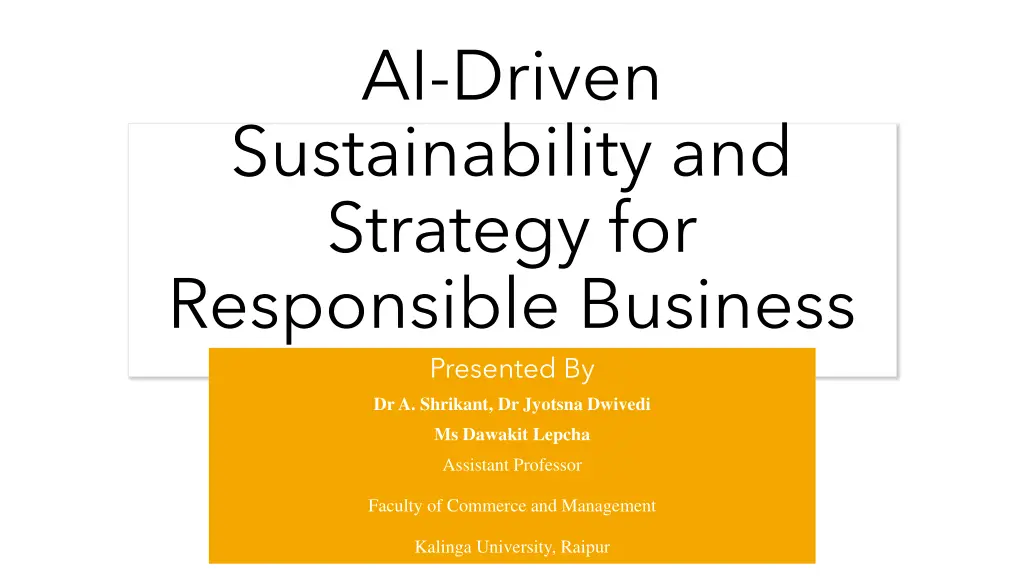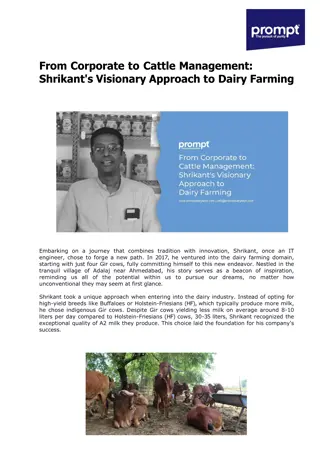
AI-Driven Sustainability and Business Innovation
Explore the transformative role of Artificial Intelligence (AI) in sustainable business practices, emphasizing the integration of AI for environmental and social responsibilities. Discover the benefits and challenges of AI deployment, along with research findings on its impact, strategic frameworks for responsible AI practices, and future directions for sustainability. Join the discussion on leveraging AI to enhance operational efficiency and resource optimization while aligning with regulatory goals and consumer demand.
Download Presentation

Please find below an Image/Link to download the presentation.
The content on the website is provided AS IS for your information and personal use only. It may not be sold, licensed, or shared on other websites without obtaining consent from the author. If you encounter any issues during the download, it is possible that the publisher has removed the file from their server.
You are allowed to download the files provided on this website for personal or commercial use, subject to the condition that they are used lawfully. All files are the property of their respective owners.
The content on the website is provided AS IS for your information and personal use only. It may not be sold, licensed, or shared on other websites without obtaining consent from the author.
E N D
Presentation Transcript
AI-Driven Sustainability and Strategy for Responsible Business Innovation Ms Dawakit Lepcha Presented By Dr A. Shrikant, Dr Jyotsna Dwivedi Assistant Professor Faculty of Commerce and Management Kalinga University, Raipur
9/4/20XX Presentation Title 2
Introduction Overview of the transformative role of Artificial Intelligence (AI) in sustainable business practices. Significance of integrating AI for environmental and social responsibilities. The growing demand for AI to enhance operational efficiency and resource optimization.
AI in Sustainable Practices Applications of AI in analyzing vast datasets for sustainability. Optimizing energy usage and reducing waste through AI- driven tools. Enhancing supply chain efficiency and product lifecycle management.
Benefits of AI Integration Achieving regulatory and sustainability goals for competitive advantages. Insights from predictive analytics aligning with consumer demand. Use cases in marketing, agriculture, and manufacturing.
Challenges in AI Deployment High investment costs in digital infrastructure and workforce training. Ethical concerns like data privacy, job displacement, and security. Strategies for addressing technological and socio-economic challenges.
Research Findings Empirical evidence showing AI s impact on operational efficiency and resource utilization. Correlation of AI integration with reduced environmental footprints. Enhanced stakeholder engagement through AI applications.
Strategic Frameworks Importance of responsible AI practices for aligning with sustainability goals. Examples of successful AI-driven business models promoting energy efficiency. Role of partnerships and open-source tools in overcoming adoption barriers.
Future Directions Need for cross-industry comparative studies on AI-driven strategies. Focus on small and medium-sized enterprises (SMEs) for scalability. Addressing ethical dilemmas and long-term impacts of AI in sustainability.
Conclusion AI s pivotal role in reshaping business strategies for sustainability. Balancing technological advancements with ethical and environmental considerations. Roadmap for leveraging AI to achieve sustainable innovation.

